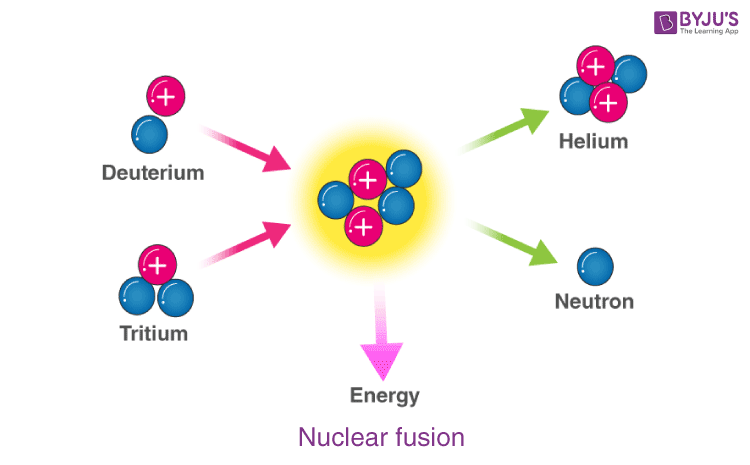| Table of Contents |
What is Nuclear Fusion?
Nuclear fusion is the process where the nuclei of two light atoms combine to form a new nucleus. This is another way of producing nuclear energy, like nuclear fission, although in nuclear fission the nucleus of a heavier atom splits. Now let us learn how energy is produced by nuclear fusion.

Important Terminologies
- Nuclear binding energy: It is defined as the energy required to split the nucleus of an atom
into its components. - Nucleon: It is defined as one of the subatomic particles i.e; proton or a neutron.
- Fusion: It is defined as a nuclear reaction in which the nuclei combine to form a massive nuclei with release of neutrons and energy.
Types of Fusion Reactors:
Based on confinement we can separate these reactors into two types.
- Magnetic Confinement: Here, the hot plasma is checked from touching the walls of the confining material by the use of magnetic fields. The temperatures achieved are extremely high, and therefore they are kept from touching material.
- Inertial Confinement: Here, the high energy density is put into a small pellet of reactors fusing them in such a short span that they don’t have the time to touch the confining material.
Parts of a Magnetic Confinement Reactor
- Vacuum vessel: It is used to hold the plasma and to keep the reaction chamber in a vacuum.
- Neutral beam injector: It is used to inject particle beams from the accelerator into the plasma in order to heat the plasma to its critical temperature.
- Magnetic field coils: Using magnetic fields, the plasma is confined in the superconducting magnets.
- Central solenoid: It is used to provide electricity to the magnetic field coils.
- Cooling equipment: It is used to cool down the magnets.
- Blanket modules: These are used to absorb heat and high-energy neutrons from the fusion reaction.
- Diverters: Used to exhaust the helium products.
Advantages of Nuclear Fusion
Following are the advantages of nuclear fusion:
- It is a safe source for the generation of electricity.
- It is economic and sustainable.
- The amount of fuel available in nature is abundant and inexpensive.
- The greenhouse gases produced during the process of fusion are minimal.
Stay tuned with BYJU’S to learn more about other Physics related concepts.
Related Physics Articles:
Frequently Asked Questions – FAQs
What is nuclear fusion?
Nuclear fusion is a process by which multiple atomic nuclei are merged to generate one or more different subatomic particles and atomic nuclei.
What is nuclear fission?
Nuclear fission is a process by which an atomic nucleus disintegrates into multiple smaller nuclei. The fission reaction usually generates gamma photons and emanates a huge amount of energy.
Give an example of a nuclear fusion reaction.
The best example of a nuclear fusion reaction is that of the merging of Tritium and Deuterium, which are two hydrogen isotopes. This reaction produces Helium, releases a neutron and gives out approximately 17 MeV of energy.
What is nuclear binding energy?
What is a nucleon?
A nucleon is the individual component of a nucleus (neutron or proton).
What are the two types of fusion reactions?
On the basis of confinement, there are two types of fusion reactors: magnetic confinement fusion reaction and inertial confinement fusion reaction.


Comments